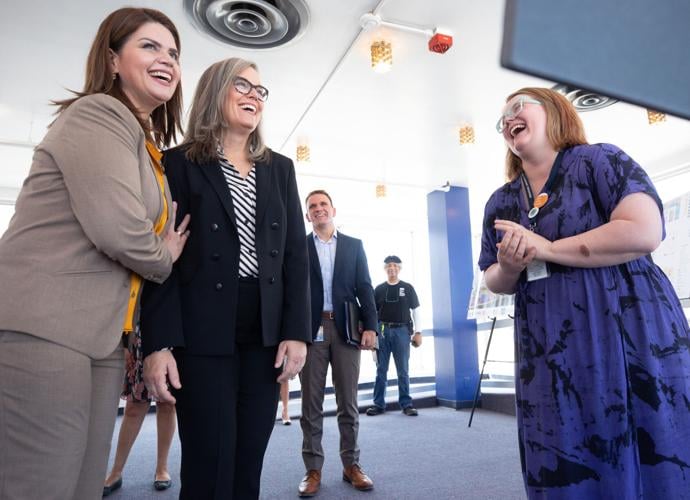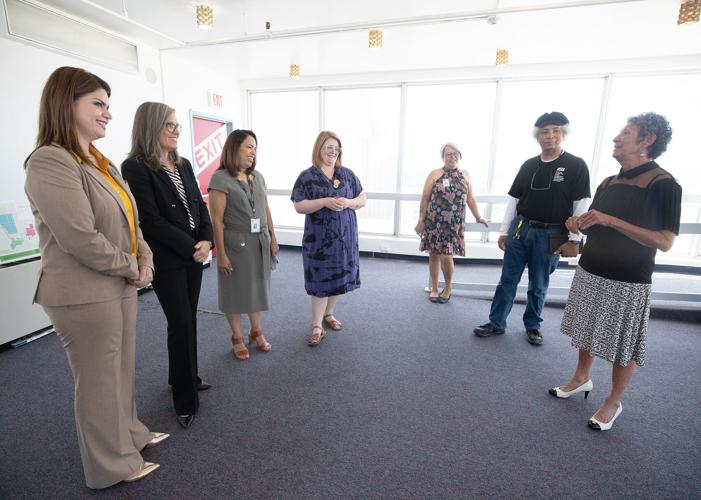On the 17th floor of Tucson’s largest public housing site Thursday, Arizona Gov. Katie Hobbs viewed the ambitious plans for reimagining the downtown high-rise.
The governor took a tour of several sites key to Tucson’s housing affordability plan after speaking to hundreds of housing development professionals from across the state at the annual Arizona Housing Forum.
During her speech, the governor pointed to the $150 million built into the state’s housing trust fund as part of the budget she signed in May. The money, Hobbs said, represents the largest allocation to date to boost the flexible funding source aimed at increasing the state’s affordable housing stock and housing assistance programs.
“While fiscal commitments such as the Housing Trust Fund is a strong first step to truly create more widespread affordability, we will need to examine and root out unnecessary and exclusionary barriers to bringing units online, allowing housing to be built at a pace that matches demand,” Hobbs said to a full ballroom at the JW Marriott Starr Pass Resort.
In a much smaller conference room at Tucson House, Hobbs said Arizona not only needs government-subsidized public housing options but to build “(private) partnerships to expand capacity.”
“I don’t think the last couple administrations have been as focused on this issue,” she said in an interview at the public housing site. “But we’re also at a point of really an affordable housing crisis across the state, so we have to take action.”
Tucson has leveraged a private partnership with affordable housing developer Gorman & Company, which will work as a co-developer with the city to turn the 408-unit Tucson House into a mix of 270 one-bedroom apartments, 60 studios and 30 two-bedroom units, according to initial plans for the project.
The public housing site has a waitlist of about 15,000 people seeking the housing option that allows residents to pay rent based on their incomes. Now, it will become a mixed-income community for those 55 and older.
The major renovations will be partially funded by $50 million the city received from the U.S. Housing and Urban Development Department’s Choice Neighborhoods program that awards grants to revitalize struggling neighborhoods with “distressed public or HUD-assisted housing.” Tucson also plans to use the funds to build family apartments where the Bum Steer restaurant was formally located on Stone Avenue and to build additional housing at the Amazon Motel property it recently purchased.
The tower at 1501 N. Oracle Road mainly houses low-income older and disabled adults. Built in 1963 as a luxury high-rise apartment building, it was converted by the city to public housing in 1979.
The plan is to initiate construction within the next couple of years by rehabilitating two floors at a time and moving residents to “whatever is the choice and best for the residents,” among the city’s other housing options, Assistant City Manager Liz Morales said.
“We’re telling (residents) we’re going to have lots of conversations with them long before (construction) actually happens,” said Morales, who previously led the city’s Department of Housing and Community Development. Existing residents who meet the 55-and-up threshold will be prioritized to move back into the renovated units first, according to Morales.
Local control, state-issued housing funds
Hobbs said contradictory to the previous administration’s actions, it’s important for the state to allow localities like Tucson to work out local housing solutions.
“During my time in the legislature, I was a champion for local control. And I brought that with me to the governor’s office, not just related to housing, but so many issues that our cities are probably best positioned to decide,” she said.
Tucson Mayor Regina Romero, who joined the governor on her tour of Tucson House, said the city’s “really suffered from a lack of state investment” in the past. Romero said she appreciates Hobbs’ attention to Tucson.
“(Investment) is something that other cities in Maricopa County enjoyed that the taxpayers of Tucson did not see that return on investment or attention from previous governors,” Romero said.
Part of that investment came in the form of $2.7 million from The Arizona Department of Housing’s new Homeless Shelter and Services Fund incorporated into the state budget Hobbs signed in May. The total fund has $60 million to allocate throughout the state for to provide services to people experiencing homelessness.
The state announced the city’s receipt of the funding on June 7, and Tucson is using it to buy the Knights Inn hotel on South Craycroft Road for non-congregate shelter space. On Tuesday, Tucson City Council entered into an agreement with Pima County to house clients from the county’s Emergency Eviction Legal Services program that assists and sometimes provides housing to recently evicted residents.
In addition to dedicating funding for homeless services, Hobbs said she hopes the Interagency and Community Council on Homelessness and Housing she’s convened will “help come up with a statewide plan for for for our administration to focus on for the next seven and a half years.”






